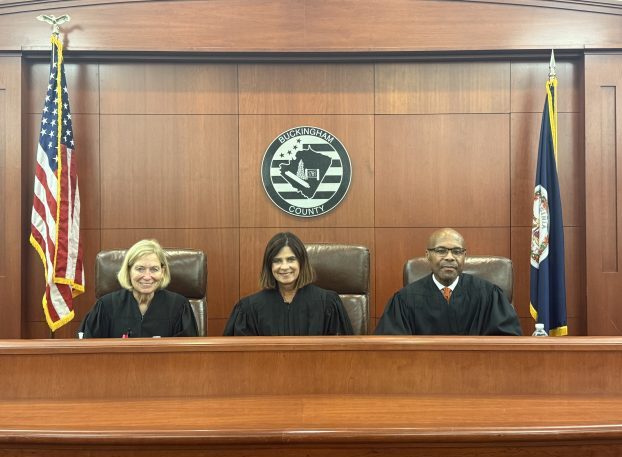PE Supervisors Ignored The Pro-Education Voices Of Real People
Published 2:41 pm Thursday, May 23, 2013
Editor, The Herald:
As one of the many citizens who spoke passionately at the 2012 public hearing of the Board of Supervisors about raising local taxes to compensate for the reduction in state and federal funding for our public schools, I would like to respond both to Mr. Dove's letter and to the editorial in The Farmville Herald about why no one spoke at this year's hearing.
I have supported the public school system since I started living in Prince Edward County thirty-five years ago, and during this time I have often spoken before the Board of Supervisors in favor of full funding for our schools and for raising our county taxes if necessary. Moreover, for the past fifteen years, as co-presidents of the local Virginia Education Association (VEA), Teri Kidd and I have sent out letters, printed flyers, and talked to people in order to “get the word out” about the annual meeting on the budget and to encourage them to attend. And throughout these fifteen years, and also before, citizens interested in the public schools attended and spoke passionately and persuasively about funding our schools and about the importance of educating our children. The Board of Supervisors has been consistently dismissive of these citizens, discounting their appeals either because they were county school teachers or members of the Longwood and Hampden-Sydney communities, people they apparently wrote off as “special interests.” The Board said it wanted to hear from “real people” like retirees and “ordinary folks,” people not associated with the school system or the colleges.
Well, in 2012 the Board of Supervisors got its wish! After I spoke as the representative of the Prince Edward Education Association to urge the Board to raise taxes in order to avoid eliminating numerous positions at the school, many, many citizens also spoke up from every nook and cranny of the county, from every ethnic group, from every economic stratum-a true representation of the county! Hey, Board of Supervisors, we were there, telling you that we were in favor of raising taxes to maintain the programs, personnel, and resources of our three schools. But the Board of Supervisors chose not to listen to the arguments and pleas of any of these citizens. It remained glued to its intractable position of not raising taxes. In fact, Chairman Fore actually opened the meeting by stating that the Board would not raise taxes! Listening to Fore's statement, before I or anyone else spoke, I wondered why bother to have a meeting when the minds of the members of the Board were already shut.
In 2012, one by one, every speaker, with a variety of insights, argued that the quality of public education is the most important thing this county can offer its citizens. None of these speakers argued that they like paying taxes, but they all understood that sometimes much worse than paying taxes is not paying them. Educating our children is how we prepare our country for the future; it is not, as our supervisors apparently think, pouring money down the drain; it is an investment in productive, useful, happy lives; it is an investment in an informed electorate, upon whom our entire system of representative democracy rests. Education is a “hand up,” not a “handout.” Every single speaker at the 2012 meeting on the budget argued in favor of a tax increase to maintain funding. The Board of Supervisors deemed other projects more important. But not funding education is like not putting aside money for one's old age: it's nice to have a few extra dollars to spend now, but when we are old and have a chill in our bones, there'll be no money for heat. Education is our security for the future.
After the Board of Supervisors decided not to raise taxes in 2012, Mr. Fore had the audacity to address teachers, staff, and administrators at the schools' August Convocation ceremony and say, “Let me know what you need; I'm here for you.” Here in concrete terms is what Mr. Fore's cuts have meant just at the elementary school, where I work. We have lost our kindergarten aides, who are instrumental in doing the things that enable one professional teacher to serve the needs of twenty five-year-olds who have to be engaged and attended to every moment of the seven-and-a-half-hour school day. Our librarian has had to double up on her classes, so that instead of teaching twenty students, she now teaches forty. The result is that students can now check out library books only every other week, not every week. Students no longer have formal computer classes and so are not learning basic twenty-first century skills like how to open and close programs or find web sites, not to mention anything about internet safety. How do the supervisors think our children will compete with children in the second and even third worlds? My own position as a school counselor has changed dramatically in the past year. My colleague and I used to provide individual and small-group counseling, but, with the total elimination of Spanish instruction, we can no longer do so because we are in classrooms the whole day so that teachers can have adequate and essential planning time. The result is that children who are between five and ten years old chase after me as I go from class to class, begging to see me and talk to me about all the trauma in their lives, from beatings and other abuse they see or experience at home to bullying at school. How will they cope without any help? What kind of citizens will they become?
My father worked thirty-seven years for a multi-national corporation. Before I was ten years old, my family had moved five times, and, by the time I completed high school, four more times. Whenever my father was transferred to a new city, the only question my parents asked was about the quality of the public school system in the new place. They did not ask about country clubs or golf resorts. I believe that most parents are just like mine and care deeply about the education of children. And not just parents! Wouldn't all citizens prefer to live in a community that educates its children?
So, Mr. Dove, I suspect that no one showed up at this year's hearing on the budget because there seemed no point in addressing a Board of Supervisors whose minds were closed to the schools. I suspect that, like me, the people who did not show up are saddened by the failure of the leadership in this county to listen and respond to rational arguments from its citizens, for whom they appear to have no respect.
Barbara Arieti
Hampden-Sydney





